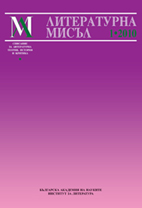В кривото огледало на тоталитаризма: човекът и времето в романа на Михаил Джавахишвили „Ратаите на Джако”
In the Crooked Mirror of Totalitarianism: Man and Time in the Novel of Mikheil Javakhishvili “Jaqo's Dispossessed”
Author(s): Irma RatianiSubject(s): Literary Texts
Published by: Институт за литература - БАН
Keywords: Totalitarianism; Mikheil Javakhishvili; “Jaqo's Dispossessed”
Summary/Abstract: The paper investigates the time-space continuum and a key character pair within a novel created in Georgia, and written in Georgian, during the early Soviet era. It pays attention to two particular representations of twin-heroes, the dissolution of identity referred to being generated (as the paper’s author suggests and the novelist implies) by the crooked mirror of the epoch: one which has doomed the man to shrink and degrade into the archetype of the Wandering Jew, Ahasver, and which has cast him away from his real Creator. Time proves to be the principal hero of the novel. The paper focuses on the interaction of the two types of time-space continuum displayed in the novel. It associates one of them with the Christian eschatological breakthrough the ancient Greek cosmos, and the other with the latter, re-thought as a symbol of earthly existence which imprisons the human soul, and in this particular case recognizable through the image of the era of Sovietization. As it occurs, each of the twin-personages has his horizon of existence belonging to one of these two types, or to one of the novel’s chronotope “hemispheres”. What is being also observed, is the relation between these parts, and within each of the two twin pairs born by this separation (the second pair evolving within one single, previously coherent in himself, personage). It appears to be a relation of mutual complementariness and non-interoperability at the same time. The paper suggests that the converging and the diverging between the two time-space types and between the two kinds of the human species might be seen as an implicit critique of totalitarianism from the viewpoint of Christianizing existentialism. It is the way, hypothesized here, in which Mikheil Javakhishvili’s novel finds its way within the anti-totalitarian discourse. The paper refrains from making an object of explicit interest the novel’s semantic ambiguity, the relevance of both the naturalistic (in the sense of aesthetics of mimesis) and the existentialist (philosophy of active resistance, or struggle) code introduced already by the novel’s title.
Journal: Литературна мисъл
- Issue Year: 2010
- Issue No: 1
- Page Range: 119-135
- Page Count: 16
- Language: Bulgarian
- Content File-PDF

